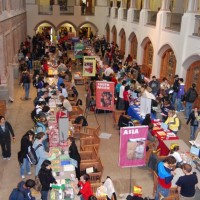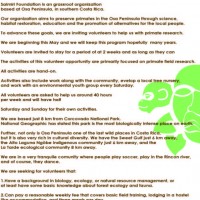Mark your calendar now, the UW Study Abroad Fair is happening on Wednesday, October 19 from 10-2 in the Mary Gates Hall Commons!
Saimiri Foundation is a grassroots organization based in Osa Peninsula, in southern Costa Rica. Our organization aims to preserve primates in Osa Peninsula through science, habitat restoration, education and the promotion of alternatives for the local people. To advance these goals, we are inviting volunteers to help us with primate research.
We are seeking volunteers that:
1. Have a background in biology, ecology, or natural resource management, or at least have some basic knowledge about forest ecology and fauna.
2. Can pay a reasonable weekly fee that covers basic field training, lodging in a hostel, and three meals a day.
To receive more information about our Volunteer Program, please write to Daniela Solano at dsolano@fundacionsaimiri.org
[study abroad] – Round River Conservation Studies

Round River Student Study Abroad Programs are field-based, authentic experiences that offer the opportunity for small groups of students to become part of our efforts, and work alongside Round River’s conservation biologists and our local community partners.
Programs include Namibia, Ecuador, Wind River, Taku River, Patagonia, Botswana…
More information available at: http://roundriver.org/
Professional Association for China’s Environment summer camp

See below for an interesting summer quarter opportunity – note that Chinese and English are used
Following the two successful PACE Summer Camps in Qingdao (2006) and Kunming (2009), PACE Network of Environmental and Resource Economists (PACE-NERE) is going to organize its third summer camp (PACE2011中国环境经济与政策国际研讨会暨资源环境经济学夏令营) in Hangzhou (Qiandaohu), China, during July 12-16, 2011.
This summer camp will include workshops on research issues in environmental economics and policy in China, lectures by distinguished scholars of both Chinese and non-Chinese origins, as well as graduate students’ sessions in environmental economics and policy research. The workshop program will cover broad issues, including but not limited to the following themes:
- Climate challenges and low carbon economy
- Green growth and natural resources
- Taxes and trading systems
- Environmental assessment and planning
- Valuation issues on health, environment and ecosystem services
- Public access to environmental information and responses from firms and local governments
- Public participation in environmental management in China
- Complex systems and adaptive management
- Comprehensive growth, green accounting and sustainability measurement
Both theoretical and applied research will be presented and discussed.
Both Chinese and English will be used in this summer camp, but the official language for July 13 and 14 will be Chinese and the official language for July 15 will be English.
This summer camp is sponsored by the Professional Association for China’s Environment (PACE), and hosted by Zhejiang University of Science and Technology, with support from Zhejiang University, Chinese University of Hong Kong, and Chinese Academy of Environmental Planning. The organizers are looking for additional support from other institutions.
Paper Submission (Deadline: April 15):
For those who are interested in presenting a paper in this summer camp, please submit a paper abstract, in either Chinese or English, to the following email address:
by April 15, 2011. A submission must include: 1) Presenter’s name, affiliation and email address; 2) Name(s) of co-author(s) if any. Notification of acceptance will be sent out by May 15, and acomplete paper is expected by June 15, 2011.
An organization committee will be established by a group of distinguished researchers and professors. For more information, please visit PACE’s website or contact Profs. Shen Manhong (Zhejiang University of Science and Technology), Li Chuan-Zhong (Uppsala University, Sweden), He Jie (University of Sherbrooke, Canada), or Dr. Wang Hua (World Bank), via email:pacesummercamp@gmail.com.
Sincerely
PACE-NERE
(PACE Network of Environmental and Resource Economists)
[information session] – Spend Autumn Quarter in the San Juan Islands!
INFORMATION SESSION!
Tuesday, March 29, 2011 at 11:30 a.m.
Wallace Hall (ACC), Suite 012 (PoE Commons)
Meet Dr. Susan Thistle, one of the instructors at UW Friday Harbor Laboratories and hear more about this exciting opportunity to take unique academic classes and conduct research!
Spend Autumn Quarter in the San Juan Islands!
Want to spend a quarter away from campus but still want to earn credits towards the environmental studies major? Located in the San Juan Islands, UW Friday Harbor Laboratories conducts environmentally related research as well as offer many unique academic courses. For Autumn 2011 (aka the ‘Marine Biology Quarter’), students are invited to participate in these opportunities by conducting research and/or taking unique academic courses. Students participating are able to select 3 courses from the following options:
–Marine Biology (BIOL/OCEAN/FISH 250) – 5 credits
this will count as one of the biology course requirements required for the environmental studies major
–Social Change and the Marine Environment (ENVIR 450) – 5 credits
this will count towards the policy & decision making and/or bioregional categories
–Ocean Circulation (OCEAN 210) – 3 credits
this will count towards the earth systems literacy (land, water, atmosphere) category (*prerequisites apply)
–Marine Environment Research (ENVIR 499) – 6 credits
this experience can be used as the capstone project; please see one of the advisers if you are interested in this option (you would need to take ENVIR 490 in Spring 2011, ENVIR 499 in Autumn 2011 and ENVIR 492 in Spring 2012)
–Ichthyology (FISH 311) – 5 credits
this will count towards the natural sciences category
–Farming, Fishing and Local Food (ENVIR 450) – 5 credits
this will count towards the human & social and/or bioregional categories
For full detailed course descriptions, please see: http://depts.washington.edu/fhl/studentAutumn2011.html#MBQ
For information about costs of the program, please see: http://depts.washington.edu/fhl/studentCosts2011.html
To apply to spend Autumn 2011 in the San Juan Islands, please see: http://depts.washington.edu/fhl/studentApplicationInfo.html
DEADLINE is July 1, 2011 or until all spots filled.
From Andes to Amazon: great exploration seminar
Looking for a great way to study abroad without taking a full quarter off? See the following for more information about an exploration seminar that has run regularly each year. This course will count as a perspectives course in either the ‘natural sciences’ or ‘international’ categories. Let Joe or Stanley know if you have questions about this.

Program Description
2011 Exploration Seminar in Peru
From Andes to Amazon: Biodiversity, conservation, and sustainability
An ecological and cultural exploration from the high mountains to the rainforest of southeastern Peru
Program Directors: Eileen O’Connor, Ursula Valdez, and Tim Billo
Dates of instruction: August 28th-September 20th, 2011The eastern slope of the Peruvian Andes ranges from altitudes of over 20,000 feet among rugged, glacier-clad peaks, to altitudes of under 500 feet in the hot, humid forests of the Amazon Basin, one of the most biologically diverse place on Earth. This region is also known for a diverse array of indigenous and modernized cultures, with an expanding population that threatens to alter the ecology and sheer beauty of this landscape forever. In this seminar, we will explore the fascinating diversity of organisms and ecosystems from the Andes to the Amazon of southeastern Peru, while studying the conservation challenges confronting this region. Through surveys of the biodiversity itself, and meetings with indigenous people, land-use managers, conservationists, and other stakeholders, we will analyze sustainable alternatives for the conservation of this world biodiversity hotspot.
Our program will begin in the mountains of Cusco where we will visit Quechuan communities, descendants of the Incas, to learn about traditional agriculture and resource use in practice. From here, we will also visit the world famous ruins of Machu Picchu, where we will learn about the historical relationship of the Incas to their environment, and the effects of present-day tourism on neighboring cloud forest ecosystems. Six days will be spent in the cool highlands of the Manu Biosphere Reserve, where we will spend time in protected grasslands and cloud forests identifying plants, insects, birds, and mammals using a variety of study techniques (including mistnetting for birds). There are many unique species to see here including some of the last remnants of Polylepis forests, ancient cycads, dozens of orchid species, and animals like the spectacular Andean Condor, Andean Cock of the Rock, Golden Headed Quetzal, and the rare Spectacled Bear.
During the second half of our course, we will stay at a remote field station on the Madre de Dios River, a tributary of the Amazon. The sheer number of species and the complexity of ecological interactions here are mind-boggling. Colorful fruit-eating birds, raucous macaws, monkeys and other arboreal mammals, butterflies, and an astonishing number of insects will be some of the many species you will see day to day. Boating trips on the river and a nearby oxbow lake may provide glimpses of the threatened Giant River Otter, rare Harpy Eagles, and large caimans. We will also be aware of intense pressures from currently expanding “modern-day” human activities such as cattle ranching, deforestation, gold mining, and road building, all of which threaten this great forested region.
In this seminar, you will be working closely with peers from the UW, applying your personal curiosity or expertise to two small-group projects, one each in the Andes and the Amazon, relating to biological resources and/or conservation. The program directors and Peruvian researchers, will guide you and share their combined expertise in ecological, sociological, and anthropological methods to gather relevant data, as well as their perspectives on conservation in the region. Be prepared to learn more, however, from the experiences we will have in the field as we travel through stunning landscapes full of natural and cultural wonders!
Students will earn 5 graded credits from the Biology department (BIOL 493) or the Program on the Environment (ENVIR 496). Participants will be evaluated on a daily journal of observations and reflections, a written report, and a presentation at a symposium, as well as positive participation throughout the course. The skills learned and applied in this program will be invaluable for any future endeavor – whether the student pursues a career in natural and social sciences, conservation, or any kind of work requiring a multidisciplinary approach and cross-cultural skills.
This Program Includes: All in-country transportation after arrival in Cusco, Peru international airport tax, all housing, 3 meals per day, and all field trips and visits during the program (including Machu Picchu).
Student costs:
$ 3,300 Program Fee
$ ~250 IPE Fee
Additional costs: Round trip travel to Cusco, immunizations, ISIC card, insurance, and personal spending money.
More information on the program, including financial aid, can be found at http://depts.washington.edu/explore/





